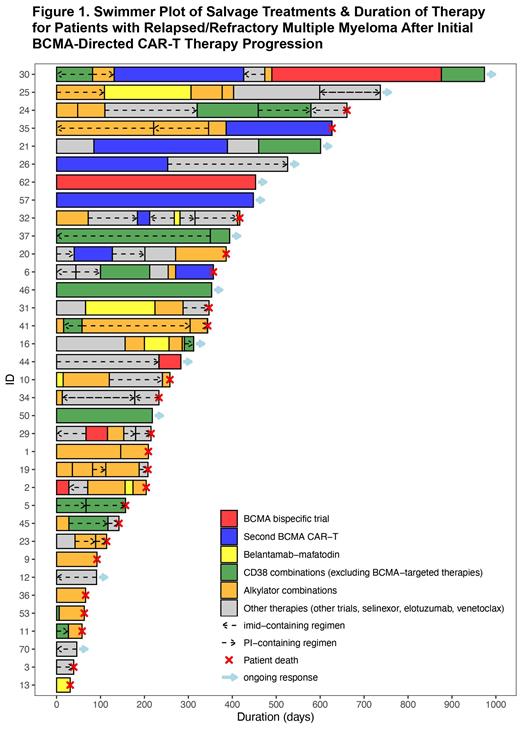Abstract
Introduction: Chimeric antigen receptor T-cell (CAR-T) therapies targeting B-cell maturation antigen (BCMA) have been shown to be effective in the treatment of patients (pts) with relapsed/refractory multiple myeloma (RRMM), leading to rapid and deep clinical responses. Despite this, most pts treated with BCMA CAR-T eventually have progressive disease (PD) and much is unknown about their outcomes and best practices with regards to post-CAR-T salvage therapies.
Methods: We performed a single-center retrospective analysis of RRMM pts who received any BCMA CAR-T therapy between January 2017 and June 2022, including pts treated on clinical trials and those who received standard-of-care idecabtagene vicleucel or ciltacabtagene autoleucel. Demographic and disease-related characteristics prior to CAR-T infusion were collected. Progression-free survival (PFS), overall survival (OS), overall response rates (ORR) defined as partial response or better by International Myeloma Working Group criteria, and minimal residual disease (MRD) negativity were evaluated. Subgroup analysis of those who had PD after BCMA CAR-T was performed to assess overall survival (OS) from time of PD and types of salvage regimens utilized including ORR and treatment duration for subsequent line therapies. Time-to-event analysis was conducted using Kaplan-Meier methods.
Results: Seventy-eight pts with RRMM received BCMA CAR-T therapy. Median age was 64.5 years. Median prior lines of therapy were 7 (range: 1- 14). Among the cohort, 59%, 64%, and 28% of pts had high risk cytogenetics (including 1q gain), were triple-class refractory, and were penta-refractory, respectively. With regards to hematologic responses, 79% of pts achieved a very good partial response or better, and 64% of pts achieving MRD negativity. The 2-year PFS was 34.6% (95% CI: 24.3 - 49.3%) with a median PFS of 13 months (95% CI: 10.6 to 22.5 months). With a median follow-up of 21.3 months, the 2-year OS was 69% (95% CI: 58% - 82.2%) with a median OS of 31.4 months (95% CI: 26.5 months - Not reached [NR]). The presence of 1q copy number gain was associated with inferior OS (median OS: 24.8 months for those with 1q copy number gain vs. NR for those without 1q copy number gain; p=0.038), whereas no statistically significant difference in OS was observed between pts with high-risk versus standard-risk cytogenetics based on the Revised Multiple Myeloma International Staging System (R-ISS).
Of 42 pts with post-CAR-T PD, 37 pts (88%) received ≥ 1 subsequent salvage therapy with a median of 3 (range: 1-8) lines of therapy. Figure 1 outlines therapies administered post-CAR-T PD. Pts who received subsequent salvage BCMA CAR-T, BCMA-targeted bispecific antibodies (bsAb), anti-CD38 antibodies, alkylators, proteosome inhibitors (PI), or immunomodulatory drugs (IMiD) as salvage therapy had an ORR of 75%, 60%, 52.6%, 46.3%, 40.6%, and 37.5%, with a median duration of treatment of 8.1, 1.6, 3.0, 1.5, 1.9, and 2.4 months, respectively, at time of analysis. Pts previously refractory to specific drug classes pre-CAR-T were able to re-demonstrate responses after CAR-T relapse including: 11 of 15 pts (73%) responding to alkylator therapy, 7 of 11 pts (64%) responding to daratumumab, 4 of 10 pts (40%) responding to carfilzomib, and 4 of 11 (36%) responding to pomalidomide despite being previously alkylator-, CD38-, PI-, and IMiD-refractory, respectively. Belantamab mafadotin was associated with 29% ORR, with 2 of 7 pts achieving hematologic response. Median OS after CAR-T PD was 14.8 months (95% CI: 10.3 -23.4 months). Among the 8 pts that received subsequent BCMA CAR-T or BCMA-targeted BsAb within 6 months of CAR-T failure, the median OS after CAR-T PD was 18 months (95% CI: 17.8 - NR).
Discussion: Although high ORR are seen with BCMA CAR-T therapy, long-term PFS remains low. Pts with RRMM who relapse after BCMA CAR-T have particularly poor outcomes. Subsequent BCMA-directed immunotherapies including alternative BCMA CAR-T or BsAb may be effective after relapse from initial BCMA CAR-T. Following BCMA CAR-T relapse, pts may also respond to therapies that they were previously deemed refractory to, but duration of responses appear limited. Novel therapies and the identification of new therapeutic targets are greatly needed for this patient population.
Disclosures
Banerjee:Clinical Care Options: Honoraria; i3 Health: Consultancy; Pack Health: Research Funding; SparkCures: Consultancy; Sanofi: Consultancy; Guidepoint Global: Consultancy; Eradigm Consulting: Consultancy; Curio Science: Honoraria. Martin:Legend Biotech: Consultancy; GlaxoSmithKline and Legend Biotech: Consultancy; Amgen, Johnson & Johnson / Janssen, Sanofi, and Seattle Genetics: Research Funding. Shah:Aztra Zeneca: Current Employment, Other: stock ownership; AstraZeneca: Current Employment, Current equity holder in publicly-traded company; GSK, Amgen, Indapta Therapeutics, Sanofi, CareDx, Kite, Karyopharm, Oncopeptides,: Consultancy; Celgene/BMS, Janssen, Bluebird Bio, Sutro Biopharma, Teneobio, Poseida, Nektar, Precision Biosciences: Research Funding. Wong:Sanofi: Membership on an entity's Board of Directors or advisory committees; Patient Discovery: Research Funding; Caelum: Research Funding; Genentech: Research Funding; GSK: Research Funding; Fortis: Research Funding; Janssen: Research Funding; Bristol Myers Squibb: Research Funding; Catalent Biologics: Consultancy; Dren Bioscience: Consultancy. Wolf:Adaptive Biotechnologies: Consultancy. Chung:Cellectis: Research Funding; Janssen: Research Funding; BMS/Celgene: Research Funding; AbbVie: Research Funding; Merck: Research Funding; Caelum: Research Funding; Sanofi: Honoraria.
Author notes
Asterisk with author names denotes non-ASH members.


This feature is available to Subscribers Only
Sign In or Create an Account Close Modal